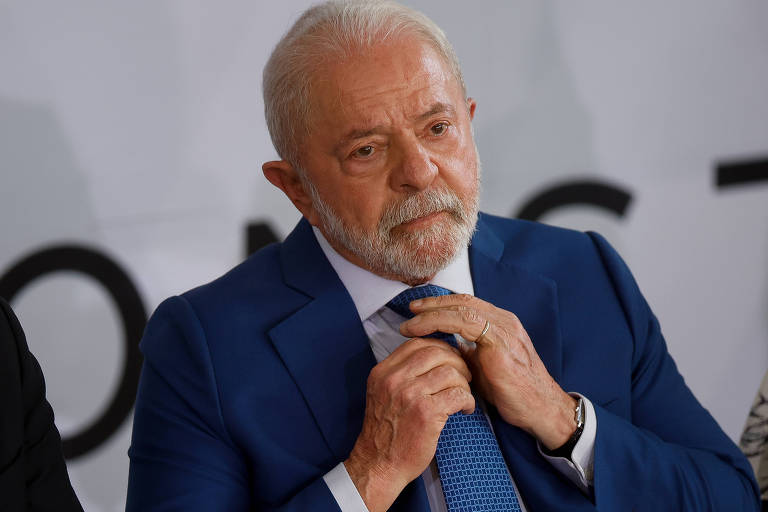Ten days before the run-off voting for the 2018 presidential election, this newspaper reported that an "illegal practice" was being used to help Jair Bolsonaro win the presidency. "Companies are purchasing large packages of messaging assailing the Workers' Party (PT) for mass dissemination on WhatsApp," Folha explained.
Bolsonaro not only denied the story but accused both Folha and PT of spreading Fake News. As Folha noted at the time, Bolsonaro's party "intended to sue" his election-year rival Fernando Haddad of PT. Bolsonaro accused PT of "spreading false news."
Upon winning the presidency, there was no law available to Bolsonaro – similar to the onewhich Lula's government is now proposing – that would have empowered his government, or judges sympathetic to him, to ban discussion online of Folha's reporting by claiming it was "fake news." But if he did have that power – if the law which PT hopes to implement to govern "fake news" had been in the hands of Bolsonaro's allies – it is very reasonable to suspect they would have used it to suppress those revelations on the ground that they were "false."
The new law proposed by Lula's government would empower both the judiciary and the equivalent of Brazil's Solicitor General (AGU) to take more aggressive action to combat "fake news" online. Among other new powers, the proposed law would permit "an action by the AGU, a body that legally represents the government, to file legal cases against those it regards as authors of false content." In a January 19 interviewwith Folha, Lula's chief spokesman, Paulo Pimenta, vowed: "we will start to respond more forcefully, more sharply, to information that distorts the truth and is wrong."
Everyone would love to live in a world in which an omnipotent and benevolent power who rules us allows only truthful statements, while it accurately identifies and suppresses all false claims. Such a world sounds like paradise: no errors, only truth. Who could possibly be opposed to that?
Unfortunately, human nature makes such a world impossible, and treating human leaders or institutions as capable of such powers quite dangerous.
Humans have tried this before. For a thousand years prior to the Enlightenment, most societies were ruled by omnipotent institutions – monarchies, empires, churches – that claimed to possess absolute truth and therefore outlawed any views that deviated on the ground that they were "false."
The core innovation of the Enlightenment, one of the greatest intellectual advancements of human liberation, was that all human institutions are fallible, that they endorse false claims either due to error or corruption, and that every individual must always retain the right to question and challenge their orthodoxies.
In sum, there is no such thing as an institution of authority that can be trusted to decree what Truth is. The oldest indigenous societies, far from Europe, had already internalized this lesson, having discardedfaith in centralized authorities in favorof decentralized power and dispersed democratic values.
As just one example, the WHO (World Health Organization) announced in February and March of 2020 that asymptomatic people should not wear masks and that doing so could make a COVID infection worse. In April, the recommendation was the opposite: everyone should wear masks.
In 2018, any Brazilian "fact-checker" would have affirmed as true the statement that Lula was a "thief," as he was convicted of multiple corruption felonies, which multiple Brazilian courts affirmedon appeal. By 2022, the situation was reversed as Brazilian courts nullified that conviction, and election courts in the 2022 campaign bannedcampaign materials calling Lula a "thief" on the ground that they were false.
If Brazil implements this proposed law, it will not be the first time a government is empowered to ban"fake news" on the internet. Other countries live under governments which have been given the power to ban content on the ground that it is judged by the state to be dangerous, to be false, to incite violence, or to foster social instability or even revolutions against the prevailing order.
Regimes with such laws are the planet's most despotic: SaudiArabia, UnitedArab Ermirates, Egypt, Singapore and Qatar (whose law, entitled "Crimes against the internal security of the State," allows the state to "impose up to five years imprisonment on anyone who spreads rumors or false news with bad intent"). There, the outcome is predictable.
All dissent against government orthodoxies and criticism of its leaders are quickly labeled "false" or "dangerous" or designed to incite violence and are censored on that ground. Last May, the UN, warningabout a newly proposed "anti-disinformation" law in Turkey, "expressed concern after the vote by the Turkish parliament of a law that could imply the imprisonment of up to three years of journalists and users of 'social media' for the dissemination of 'fake news'."
These abuses of "fake news" laws happen there not because those countries are different, but because they are the same. All powerful leaders, even well-intentioned ones, are tempted to ban dissent on the grounds that it is dangerous of "false."
It is likely for these reasons that "the large portion" of the legal specialists consultedabout this law by Folha "emphasized that a legal process of this kind by the government can set a precedent that represents a risk to freedom of expression, given the possibility of being weaponized for judicial harassment against critics and opponents."
Even if you are lucky to have found the most trustworthy and benevolent leaders in history, ones who are somehow capable of decreeing truth without erring and who use such laws only in the most noble ways, at some point other leaders will be elected and they, too, will have such powers.
The question for any law is not whether one is comfortable with it in the hands of leaders one likes and trusts, but how it will be in the hands of different leaders.
